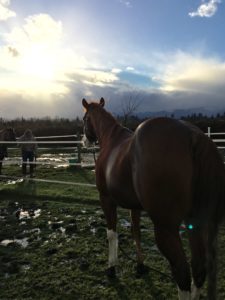
It’s a given. If you live on the wet side of the Pacific Northwest, and it’s not summer, you’re going to have rain. It may be fairy-fingers rain that tickles your face, whispers in your hair. A downpour that turns gardens into bogs and potholes into sinkholes. Or sideways-raging rain that flips your umbrella inside out, and power washes discarded fast-food wrappers to Nebraska and back.
Don’t get me wrong. Rain is more than welcome now, after three years of drought. But it wears on you, waking up day after day to a tattoo of drops on the windows and skylights. Waiting for this fingernails-on-blackboard sound to lessen or stop. Hunkering long, dark hours indoors to write, read or indulge in other indoor sports.
At some point you huff and say, “Flake it! I need daylight, fresh air and outdoor exercise. What’s a little rain?!” So you slip into your jacket, rain topper and garden clogs, and venture out to scoop puppy poo. Clean up the side yard. A chore you’ve let slide since the deluge began. Productive exercise which will make you feel better, and also encourage those welfare “companion animals” aka “dogs,” to go do their biz despite the downpour.
“Wow!” You think while you trowel up endless squishy brown blobs to toss in the bucket as water sneaks under your collar and soaks your pant legs. “Who knew three Boston Terriers could be overachievers in the animal-waste department?”
Back indoors for more hours of boredom, punctuated with moments of sheer terror when the wi-fi dies, you consider better ways to amuse yourself outdoors. You ARE outdoorsy, after all.
Maybe a little walk in the rain, no chore required, will lift your spirits. Maybe you should embrace limitations, walk with them, try to turn them into blessings. Whatever.
You suit up once again, hope springing eternal and all that. Out you go. First you slip on the wet step and barely catch yourself. Then you’re blinded suddenly by a raindrop the size of a softball. Wind buffets your body while rain soaks your socks. You head home.
Another day and night indoors. Cabin fever sets in, big time along with depression. This can’t go on. But. Are you going to give up? Let serial squalls and storms keep you down? No! Are you a wimp, or Master of Your Fate?
An hour later, dressed like a flat-hatted, poncho-togged Clint Eastwood in “The Good, The Bad and The Ugly” — minus the cheroot — you stand beside your saddled horse. He shoots you a baleful look as you stare through the barn doorway at a wet curtain of Amazon-forest proportions. “REALLY?” he seems to say.
“Let’s do this,” you reply, voice firm with resolve. You swing into the saddle, arrange your riding poncho over it and part of Brad, and firmly ride out. It will be exhilarating, to ride in the storm. Energizing, to laugh at the elements when no one else is riding (except those who must, like cowboys and mounted police). Maybe even kinda fun?
Kaplop, squish, splat, go your hoofbeats around the puddled outdoor arena. Temporary blindness ensues from poncho malfunction. Water dribbles under your seat. Great: wet unmentionables.
Twenty minutes later, looking like drenched rats or Ninja mud-wrestlers, you and Brad are back in the barn. Steam rolls off your backs. Rain courses down your legs to pool at your feet. Cuss words — or in Brad’s case, green slobber — spews from your lips.
Well, you did it. Not pretty, but you did it,. Cowgirled up and rode, dammit, in the rain.
Whoa! Stop the presses. Throw a party. Strike a medal.
Riding in the rain, doing just about anything in the rain, especially endless hard rain with wind, is no picnic. It takes planning. You wouldn’t do it every day.
But you know? Sometimes you just gotta saddle up and do it. Put your head down and go. Take it as it comes. Once dried off, back in your cave and glowing with warrior pride, you see life differently. It looks a little better.
And there’s this: Riding in the storm beats the bejabbers out of boredom.

